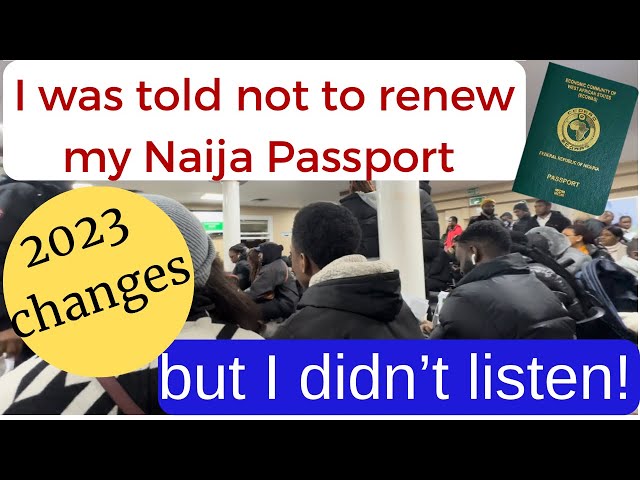Nigeria’s passport has inched its way up the global mobility ladder, climbing to 88th place in the 2025 Henley Passport Index released this month. The HPI ranks 199 passports against 227 travel destinations; based on the number of destinations a passport holder can access without a visa. The data used comes from the International Air Transport Association (IATA). After languishing in the high 90s for much of the past five years, the slight three-place rise from January may offer a flicker of optimism; but let us be clear: this is no cause for celebration. Nigeria’s passport rank of 88 out of 199 is not just a number. In an era when global mobility defines economic opportunity, diplomatic prestige, and national credibility, this is a public indictment of the government’s chronic inability to project global trust, reform immigration systems, and restore dignity to its citizens.
With visa-free or visa-on-arrival access to only 45 countries, the Nigerian passport remains one of the least powerful in Africa, ahead of only six nations grappling with prolonged conflict or instability – South Sudan, Sudan, the Democratic Republic of Congo, Eritrea, Libya, and Somalia. That’s hardly company we should be keeping in 2025. Yes, the numbers have moved in the right direction: from 103rd in 2021 to 88th today. But the pace is glacial, and the broader reality remains unchanged; a Nigerian passport still limits opportunity, dignity, and global participation for tens of millions of citizens.
The Nigerian passport stands as a bitter reminder of how far a nation can fall when leaders abdicate their responsibility. This is more than a domestic shame; it is a diplomatic liability that has contributed to Nigeria’s failure to negotiate meaningful visa waiver agreements, and to its citizens being treated as second-class travelers across the globe – detained, denied, and humiliated at foreign ports of entry. The implications are staggering. Students miss academic opportunities. Entrepreneurs are cut off from global markets. Families are separated by borders they cannot cross. And the country’s already battered international image sinks further into the mud. How did a nation of such rich resources, vast potential, and proud people become shackled by a passport that increasingly resembles a scarlet letter on the world stage? The answer lies in years of neglect, corruption, mismanagement, and a complete lack of ambition from those entrusted with Nigeria’s image management abroad.
Compare this to our African peers. Seychelles, still leading the continent despite a slight dip to 24th globally, enjoys visa-free access to 156 countries – more than three times what Nigeria offers. Even Ghana, Rwanda, and Botswana consistently outperform Nigeria in passport mobility, reflecting their relative success in building trust with foreign governments, strengthening domestic institutions, and enhancing global engagement.
The global passport rankings are not about printing fancy passport booklets; or reducing passport application wait times; or electronic visa applications. They reflect how the world sees us – our internal security, governance, diplomatic capital, economic reputation, and respect for human rights. Nigeria’s low mobility score is not a clerical error. It’s a direct result of: persistent security challenges, from terrorism to kidnapping and banditry. Also, weak identity management systems, raises doubts abroad about passport authenticity. Besides, corruption in immigration processes, fuel visa fraud and human trafficking. In addition, limited diplomatic reach, especially in forging bilateral or multilateral visa waiver agreements. Until these foundational issues are addressed, no amount of incremental index gains will give Nigerians the travel freedom they deserve.
Indeed, passport power matters. This is not just a matter of prestige. A weak passport constrains everything from business and academic exchange, to emergency travel, to diaspora engagement, and even tourism development. When Nigerian professionals, students, or artists are repeatedly denied access to international opportunities due to onerous visa restrictions, we all lose. It also exacts a financial toll. Visa applications for Nigerians often come with high fees, lengthy processing times, and humiliating scrutiny – not to mention the additional burden on embassies and consulates. Meanwhile, potential foreign investors and partners take note of these signals: a country whose citizens struggle to move freely often seems closed for business.
What Must Be Done? Well, if this government is serious about transforming Nigeria’s global standing, passport power must become a national priority. Here are urgent steps the administration must take: first, strengthen diplomatic outreach to negotiate more reciprocal visa agreements, particularly with strategic trade and education partners. Second, clean up and modernize immigration systems, ensuring secure, biometric-based passport issuance and efficient border control. Third, invest in national security and governance, which boosts global confidence and opens doors for mobility. Fourth, engage the diaspora, whose positive contributions abroad can help rebrand Nigeria and build goodwill. And finally, restore trust in the Nigerian passport by tackling document fraud and prosecute passport racketeering. The government must recognize that global mobility is not a luxury; it is a basic element of national development, human capital strategy, and international influence.
The passport is more than just a travel document. It is a symbol of how the world sees us; and how we see ourselves. A three-point improvement in global rankings is not a triumph. It is a reminder of how far we still have to go. Let us not settle for mediocrity masked as progress. Let us demand a passport that truly unlocks the world for Nigerians; not cages them within borders not of their choosing, but of global distrust. The time for half-measures is over. It’s time to secure the Nigerian passport.





